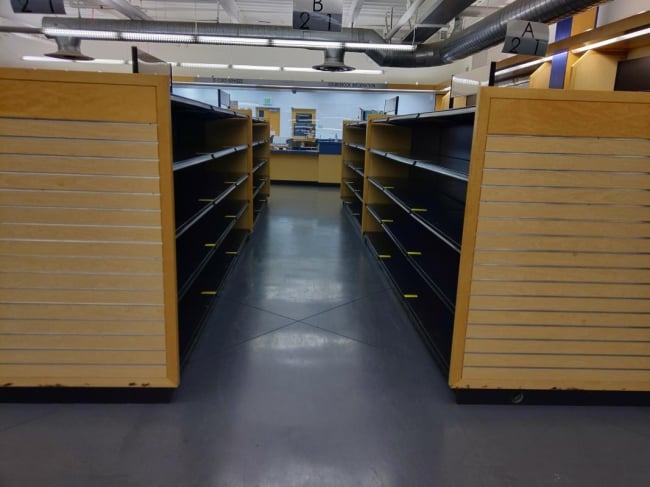You have /5 articles left.
Sign up for a free account or log in.

Empty bookshelves in the former UC Santa Cruz bookstore
University of California, Santa Cruz
The University of California, Santa Cruz, uses much of the space in its former campus bookstore to house a resource center for students with disabilities. Virginia Wesleyan University turned its bookstore into a merchandise shop with printing services and a post office. Jackson College, a community college in Jackson, Mich., has transformed its bookstore into a convenience store that also sells electronics. The University of Alaska Anchorage used its bookstore’s old footprint to create a one-stop shop for student enrollment needs.
These are just a handful of the dozen-plus institutions that have closed or transformed campus bookstores in recent years, largely for financial reasons or because of the difficulty of managing them. As students have migrated online to buy books, the profits of campus bookstores have plummeted, prompting college administrators to shut down the stores and pursue deals with full-service online providers of textbooks and other course materials, such as Akademos.
Akademos and a similar online textbook provider, BibliU, have been at the ready with alternatives for institutions looking to outsource the hard work of managing book inventory and selling texts—and to do so affordably.
Dan Phelan, president of Jackson College, said he spent several months trying to negotiate with Follett Higher Education Group, the largest campus store operator in the United States, which had been running the Jackson campus bookstore, but the prices it was asking for digital books were ultimately too high. (Follett did not return a phone call or answer an email seeking comment.) Phelan said during the course of the pandemic it became clear to him that there was a real socioeconomic divide among his students, with some struggling to buy the books and other materials they needed to succeed.
“This is an equity issue—equity in terms of being able to have the material right away and equity in terms of cost,” Phelan said. “Some of these textbooks that we’ve been dealing with approach $800, and so you can imagine, if you’re maxed out … $800 takes a big bite out of what you could be using to pay for tuition, support materials, supplies, those kinds of things, let alone childcare, transportation.”
Phelan said improving student success metrics was a big motivator for him. Jackson College’s surveys of students, as well as outside research, found that students who don’t have books on the first day of classes are at a big disadvantage academically.
“If we can provide a textbook in the hands of every student for $50 a class, that is a game changer with regard to the cost of higher education for students,” Phelan said.
Phelan said his administration determined long ago that many students were not buying books because they needed the money for rent. As a result, the bookstore stocked extra copies of textbooks so students could at least access the material in the store and make photocopies of chapters they needed.
BibliU appealed to Phelan as a partner because he wanted “to dive deeper and more quickly” into cost savings than Follett could offer. He said that by working with BibliU, his team was able to convert the brick-and-mortar bookstore into a digital bookstore in six weeks with 90 percent of the courses offered at Jackson having textbook needs met by BibliU.
Phelan said BibliU also offers analytics tools, which allow faculty to monitor how long students are spending on reading and track that back to student success. He said students can also use the BibliU digital platform to highlight text and make margin notes.
Jeff Nelson, vice president of industry collaboration and development for the National Association of College Stores, said he has spoken with an increasing number of college leaders in recent months about transitioning to a digital bookstore. He named at least a half dozen institutions that have already made the switch, including Eastern Gateway Community College, Clark University and Meredith College.
“In some cases, it’s because they’re losing money,” Nelson said. “But it’s also in large part because of the complexity of the course-materials process today compared to … a decade ago, [when] things were a lot easier, a lot more simple. A school doesn’t have to be losing money to decide to outsource their textbooks to an online partner.”
Nelson said colleges had gradually been transitioning to digital bookstores, but the pandemic dramatically accelerated the trend because of a greater reliance on digital content. He said the pricing models online book purveyors such as Akademos can offer also appeal to administrators. Akademos works with institutions to make textbooks more affordable and will reduce its profit margin if institutions agree to prioritize textbook affordability as opposed to maximizing commissions for the university, Nelson said.
Raj Kaji, CEO of Akademos, said his work with the University of California, Santa Cruz, which shuttered its bookstore last month, is in line with what has become a “very typical scenario.”
Institutions are “bearing witness to the evolution of students increasingly using electronic materials to access their content,” Kaji said. “Santa Cruz, as well as many of our clients, think about this transition and ask themselves this fundamental question of, ‘Well, what does it mean to have a physical bookstore in an age where increasingly we’re not selling physical books?’”
David Weaver, executive director of campus services at the University of Alaska at Anchorage, said the decision to partner with Akademos was primarily financial.
The university had been subsidizing the brick-and-mortar bookstore for five or six years with mounting losses that eventually reached into the seven figures. So when university administrators closed the bookstore in response to the pandemic in spring 2020, they decided to sign up with Akademos a couple of months later, in June.
He said the university moved a one-stop office for enrollment needs that had been located a mile from campus into the bookstore space. Weaver said the switch to Akademos, which finds the cheapest possible price for books, is saving students an estimated $800,000 a semester in spending on textbooks.
Weaver said that while he is grateful for the cost savings to students and faculty, he feels some nostalgia for what a campus bookstore represented in terms of campus life—and more than a little bit of loss.
“It’s hard seeing a bricks-and-mortar bookstore go away—it has a sense of place in our heart,” Weaver said. “There’s often food or coffee associated with it and socializing … It is a little bit sad to see that experience go away. At the same time, we live in the real world … I think it’s just the way that the economy is evolving, and I live with that.”








